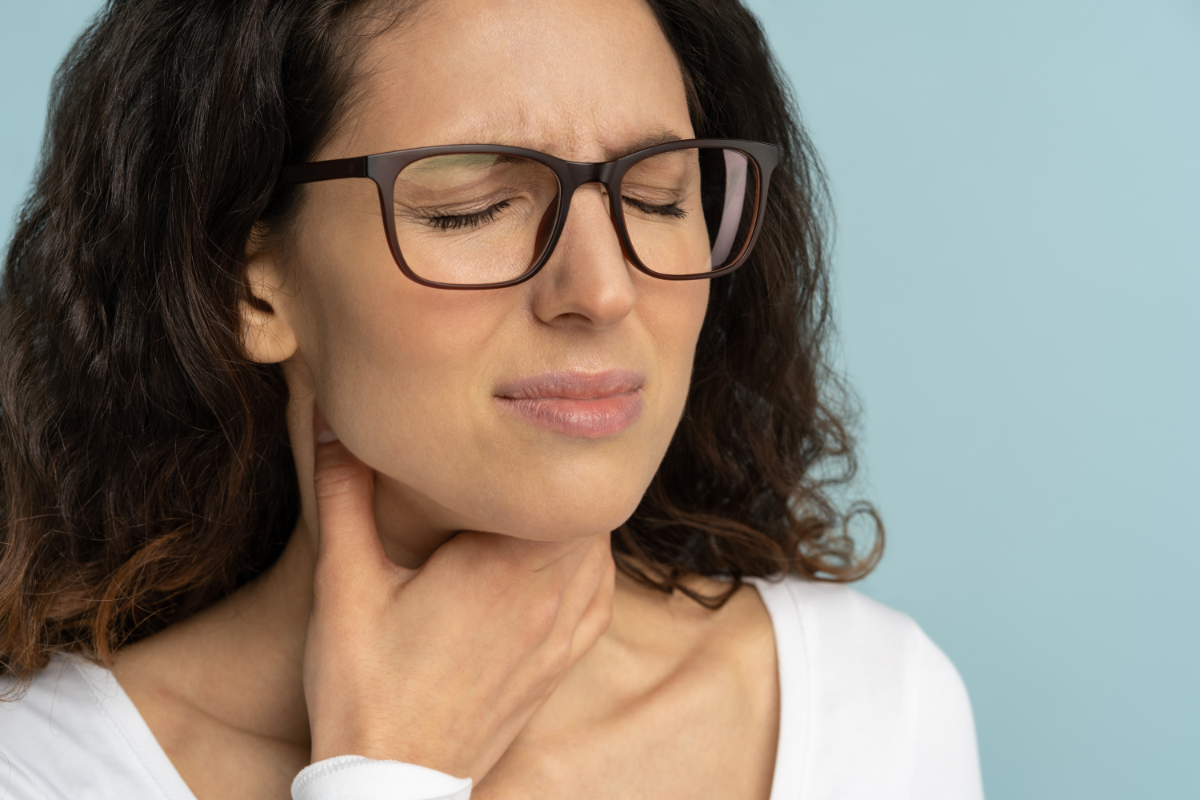Hoarseness and aphonia are vocal problems that can disrupt our daily lives. These conditions, often caused by infections, allergies, stress or vocal overwork, can lead to an altered voice, making communication difficult. This article looks at these common vocal problems and explores homeopathic treatments that offer effective and appropriate solutions.
We’ll start by looking at the various causes of hoarseness and aphonia, then discover why homeopathy is a valid option for treating them. Finally, we will detail the recommended homeopathic treatments, highlighting their dosages and indications.
The aim is to help you better understand these vocal problems and discover how homeopathy can provide personalised relief to help you regain a clear and healthy voice.
What causes hoarseness and aphonia?
Hoarseness and aphonia are common voice disorders that can have a significant impact on quality of life. Although precise statistics are not always available, it is widely recognised that these voice problems can result from a number of causes, each with its own mechanism and triggers.
Viral infections
Viral infections, such as acute respiratory infections, influenza or the common cold, are one of the most common causes of hoarseness and aphonia (2). When the upper respiratory tract is infected, the vocal cords can become inflamed, causing voice alteration.
Allergies and environmental irritants
Seasonal allergies and exposure to environmental irritants such as cigarette smoke, air pollution or irritating chemicals can also cause vocal problems by irritating the upper respiratory tract. (3)
Vocal overwork and stress
Vocal overwork, often seen in people who use their voices excessively, such as singers, teachers or professional speakers, can lead to hoarseness or aphonia. In addition, emotional stress can have a negative impact on the vocal cords, contributing to these vocal problems. (1)
Why choose homeopathic treatments for dysphonia?
Using homeopathy to treat dysphonia, such as hoarseness and aphonia, is a valid and increasingly popular option. This therapeutic approach has a number of significant advantages over conventional methods of treating voice disorders, making it a relevant choice for many people. Let’s explore these advantages.
1. Personalised treatment :
One of the main advantages of homeopathy is its ability to tailor treatment to each patient’s individual symptoms and constitution. Unlike conventional treatments, which can be standardised, homeopathic remedies are selected taking into account each person’s unique characteristics. For example, a patient suffering from hoarseness may receive a specific homeopathic treatment based on the nature of their hoarseness, their sensitivity to cold or heat, and other individual characteristics.
2. No harmful side effects:
Homeopathic medicines are prepared using specific dilution and dynamisation processes that make them non-toxic and devoid of harmful side effects. This characteristic is particularly valuable for people suffering from dysphonia, as they can use homeopathic treatments without fear of the side effects commonly associated with certain conventional medicines.
3. Holistic treatment :
Homeopathy takes a holistic approach to health, considering the patient as a whole. Vocal symptoms, such as hoarseness or aphonia, are seen as manifestations of a wider underlying imbalance in the body. By treating this imbalance, homeopathy aims to restore the patient’s overall health, which can contribute to a more complete and long-term recovery.
Homeopathy is active:
- In hoarseness and aphonia due to vocal overwork, or in dysphonia in asthenic subjects.
- In recent-onset hoarseness or aphonia of non-specific infectious origin. As these cases are most often viral in origin, it is advisable to take a dose of Oscillococcinum as soon as possible, and repeat it six hours later, as clinical use has shown this medicine to be effective in viral diseases in the early stages.
What homeopathic treatments should I choose for hoarseness caused by vocal overwork?
When hoarseness results from vocal overwork, homeopathy offers a range of specific remedies that can provide effective relief. This detailed section looks at these homeopathic treatments, highlighting the exact dosage and describing who they are suitable for depending on the vocal profile. In addition, we illustrate the effectiveness of these remedies through concrete examples of successful cases.
Arum triphyllum :
Arum triphyllum is indicated in cases of hoarseness with a bitonal voice, where the vocal timbre varies constantly, sometimes clear, sometimes veiled, depending on the tone used. For optimum relief, the recommended dosage is to take Arum triphyllum 5CH, 5 granules every 2 hours, spacing out the doses according to improvement. This is a suitable choice for people with these specific vocal characteristics.
Rhus toxicodendron :
Rhus toxicodendron is indicated in cases of hoarseness that present a characteristic modality: improvement through movement. Hoarseness only appears at the start of speech or singing, then gradually improves, only to reappear when tired. For optimum effectiveness, the recommended dosage is Rhus toxicodendron 7 or 9CH, 5 granules 1 or 2 times in the hour before intensive vocal use. This homeopathic option is suitable for individuals who respond to this specific vocal modality.
Arnica :
Arnica montana is indicated when hoarseness is the consequence of excessive vocal cord fatigue. For example, after talking, shouting or singing too much. The recommended dosage is Arnica 9CH, 5 granules 2 to 4 times a day. This is a wise choice for those whose hoarseness is associated with excessive use of the voice.
Argentum metallicum :
Argentum metallicum is particularly suitable for pharyngitis in singers or speakers, resulting in hoarseness or aphonia with a sensation of a wound in the larynx. The cough may produce thick, greyish or viscous mucus. For effective relief, the recommended dosage is Argentum metallicum 5CH, 5 granules every 2 hours, spaced out according to improvement. This is a suitable choice for those with these particular symptoms.
Argentum nitricum :
Argentum nitricum is preferable if the person experiences a stinging sensation in the throat, with a perpetual need to “clear the throat”. This vocal modality may have an emotional cause, such as stage fright. For optimum effectiveness, the recommended dosage is to take Argentum nitricum 5CH, 5 granules every 2 hours, spacing the doses according to improvement.
Manganum aceticum :
Manganum aceticum is specifically suitable for hoarseness caused by damp cold or prolonged speech. For effective relief, the recommended dose is Manganum aceticum 5CH, taken 2 to 4 times a day, spaced out according to improvement. If left untreated, hoarseness can frequently be complicated by bronchitis.
Causticum :
Causticum is indicated in cases of paralysis of the vocal cords after significant vocal effort or viral infections. For optimum effectiveness, the recommended dosage of this homeopathic remedy is to take Causticum 7CH, 5 granules 2 to 4 times a day, spacing the doses according to improvement. This remedy can be particularly effective for those whose hoarseness worsens in the morning.
Phosphorus :
Phosphorus is indicated for hoarseness that worsens in the evening and first part of the night, with intense pain in the larynx. For optimum effectiveness, the recommended dosage is to take Phosphorus 7CH, 5 granules 2 to 4 times a day, spacing the doses according to improvement.
Magnesia carbonica and Graphites :
These two medicines are recommended for women who suffer from sore throats with aphonia, before Magnesia carbonica or during menstruation (Graphites). For optimum effectiveness, the recommended dosage is to take Magnesia carbonica or Graphites 5CH or 7CH, 5 granules 2 times a day, a few days before the period when the symptoms are usually expected.
What homeopathic treatments should be chosen for dysphonia in asthenic subjects?
The choice of homeopathic treatments for dysphonia in asthenic patients is crucial to ensure an optimal therapeutic response. In this section, we will examine these treatment options in detail, highlighting the precise dosage and indicating the specific situations in which doctors recommend these medicines.
Phosphoricum acidum :
Phosphoricum acidum proves to be a wise choice in asthenic subjects after emotional shocks or vocal overwork. The recommended dosage is Phosphoricum acidum 15 CH, one or two doses per week. Asthenic individuals suffering from dysphonia linked to emotional factors or vocal exhaustion will find this option particularly suitable.
Kalium phosphoricum :
Doctors recommend Kalium phosphoricum for asthenic subjects when they experience nervous irritability after overwork. For optimum effectiveness, the recommended dosage is to take Kalium phosphoricum 9CH once a day. This remedy is suitable for those with vocal symptoms associated with increased nervous tension.
Ignatia :
Ignatia amara is a homeopathic strain to consider whenever there is extreme irritability and hyperesthesia of all the senses, with a lumpy feeling in the throat, as well as a need to sigh. The entire symptomatology is also accompanied by paradoxical modalities. For optimum effectiveness, the recommended dose is Ignatia 9CH, 5 granules every morning on waking. Asthenic subjects suffering from vocal problems linked to intense emotions will find this an appropriate option.
How can dysphonia be prevented?
- Curr Opin Otolaryngol Head Neck Surg. 2010 Jun;18(3):176-81. doi: 10.1097/MOO.0b013e32833952af. Vocal allergy: recent advances in understanding the role of allergy in dysphonia
- J Voice. 2017 May;31(3):392.e13-392.e32. doi: 10.1016/j.jvoice.2016.10.002. Epub 2016 Nov 15. A Systematic Review of Voice Therapy: What “Effectiveness” Really Implies







